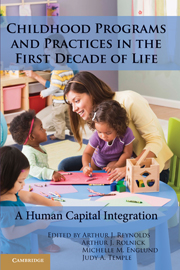Book contents
- Frontmatter
- Contents
- Contributors
- Foreword: The Essential Role of Youth Development by Robert H. Bruininks
- Acknowledgments
- 1 Early Childhood Development and Human Capital
- PART I PRENATAL AND INFANT PROGRAMS
- PART II PRESCHOOL EDUCATION
- PART III KINDERGARTEN AND EARLY SCHOOL-AGE SERVICES AND PRACTICES
- PART IV ECONOMIC SYNTHESES OF EARLY CHILDHOOD INVESTMENTS
- Appendix Question-and-Answer Sessions
- Name Index
- Subject Index
Appendix - Question-and-Answer Sessions
Published online by Cambridge University Press: 05 June 2012
- Frontmatter
- Contents
- Contributors
- Foreword: The Essential Role of Youth Development by Robert H. Bruininks
- Acknowledgments
- 1 Early Childhood Development and Human Capital
- PART I PRENATAL AND INFANT PROGRAMS
- PART II PRESCHOOL EDUCATION
- PART III KINDERGARTEN AND EARLY SCHOOL-AGE SERVICES AND PRACTICES
- PART IV ECONOMIC SYNTHESES OF EARLY CHILDHOOD INVESTMENTS
- Appendix Question-and-Answer Sessions
- Name Index
- Subject Index
Summary
PART I: PRENATAL AND INFANT PROGRAMS
Barbara Devaney, Mathematica Policy Research, “WIC Turns 35: Program Effectiveness and Future Directions” (Chapter 2)
David L. Olds, University of Colorado Health Sciences Center, “The Nurse-Family Partnership: From Trials to Practice” (Chapter 3)
Frances A. Campbell, University of North Carolina, “Carolina Abecedarian Project” (coauthor: Craig T. Ramey, Georgetown University) (Chapter 4)
Q: “Why do the nurses produce larger effects than the paraprofessionals?”
SPEAKER DAVID OLDS:
A: First of all, the families visited by paraprofessionals did not open their doors to the visitors as they did for the nurses. It goes back to this point about families having to believe that this is worthwhile for them to engage in. The result is that the nurses completed more visits than paraprofessionals did. But the differences that we see between nurse-visited families and paraprofessional families are not simply explained by the quantitative results – the number of completed home visits. It looks like on a per-visit basis, the nurses are accomplishing more as well. I think that what we're seeing is that nurses are more successful in eliciting the kinds of behavioral changes and adaptive responses that we all would like to see than paraprofessionals are. I think that goes back to their basic training and clinical competence in being able to manage the complexities that they encounter in dealing with families with multiple issues regarding health, behavior, social contexts, and so forth, that make life hard.
Information
- Type
- Chapter
- Information
- Childhood Programs and Practices in the First Decade of LifeA Human Capital Integration, pp. 453 - 488Publisher: Cambridge University PressPrint publication year: 2010
